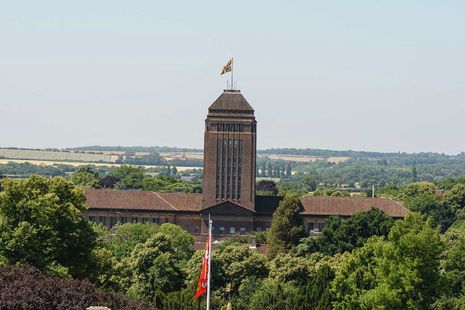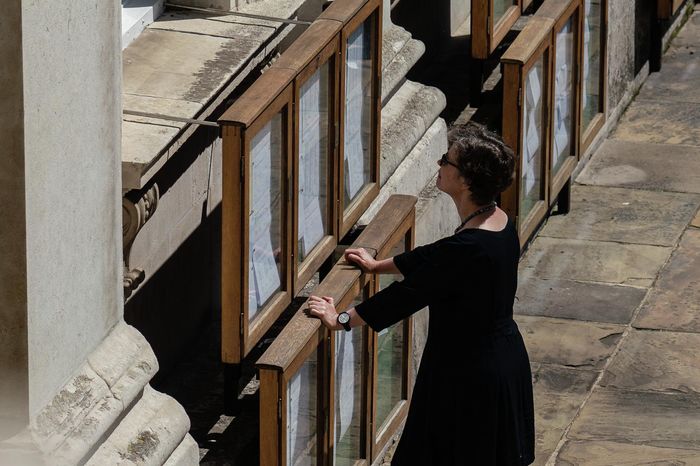Why shouldn’t we share our libraries with A-level students?
Sophia Bosworth-Gerbino argues that we need to remember that Cambridge is not solely a university town when complaining about A-level students in our libraries

The ‘town and gown’ divide in this city is nothing new, and perhaps an unsolvable issue in its entirety. However, it is important to recognise, and ideally repair, the disconnection. In particular, I believe that the debate over whether A-level students should be allowed to use our libraries is just another way in which the University alienates Cambridge’s local population.
Although our intense workload and the ‘Cambridge bubble’ make it easy to forget, the city we study in for twenty-four weeks a year is also home to thousands of others outside of the University. As an Oxford local myself, I am used to living in a city dominated by an institution that prevents me from accessing vast parts of my own hometown. Thus, I cannot see Cambridge’s welcoming of A-level students into the UL as anything but positive. Especially given the fact that, if Cambridge is anything like Oxford, its few public libraries will be perpetually underfunded and overcrowded during exam season.
“Cambridge is home to thousands outside of the University”
It is not as though our University has a shortage of places to study. The Sidgwick Site boasts at least ten libraries, and each college has one, alongside other rooms to revise in (I am a humanities student so cannot even comment on the mysterious West Hub). Ultimately, it is far easier for us to find a seat in one of the 139 University libraries than A-level students who have the choice of the 6 public ones.
In my view, the aversion to allowing sixth formers access to the UL borders on the usually unfair accusations of elitism attributed to some Cambridge students. It is even reminiscent of the condescending term ‘townie’ that makes me roll my eyes whenever I hear it. The excuse that our libraries are intended for, and therefore should only be open to us, is a lazy one that ignores the wider context of the city in which we live. The primary purpose of any library is to provide free access to knowledge, resources, and quiet places to study. Refusing people this privilege, when we have an abundance of it, is undeniably selfish. Indeed, like most other universities, Cambridge receives public funding, giving us the obligation to extend the benefits of our education and assets to the wider society.
“Life in Cambridge does not stop simply because it is our exam term”
I am not suggesting that every single college library should be overrun by 17-year-olds studying the Tudor dynasty or atomic structure. But having a handful of them in the UL is hardly an issue. If anything, I somewhat enjoy the wave of nostalgia I get when spotting an AQA or Edexcel textbook on a reading room desk. It goes without saying that these students, like us, are expected to remain quiet when studying in any library. However, in my experience, A-level students who have made the trip to the UL can often be more focused than some freshers, for whom the consequences of their exams are less significant.
Additionally, the very existence of this conversation is not solely indicative of Cambridge’s unique town and gown relationship. It also points to the heightened pressure of exam term, an issue under debate for its detrimental impact on student mental health. If the stress of exams is so extreme that people can’t even fathom sharing their libraries, we must examine its sustainability. Sixth formers use the libraries of many other Universities without issues, including UCL, Bristol, Edinburgh, and Warwick, to name a few.
Every Cambridge student can attest to the stress of any type of exam, especially the ones that determine where we go to university. We should extend the empathy of shared experience to these sixth-formers. By sneering at these younger students and writing scornful Camfess posts about them, all we are doing is perpetuating the ‘us vs them’ narrative. Ultimately, the presence of A-level students should not be viewed as an intrusion but as an opportunity to bridge the gap between the University and wider town, as well as to re-evaluate our entitlement to Cambridge’s public spaces. Whichever side of this debate you fall on, it is important to remember that life in Cambridge does not stop simply because it is our exam term.
 News / Colleges charge different rents for the same Castle Street accommodation2 March 2026
News / Colleges charge different rents for the same Castle Street accommodation2 March 2026 News / News in Brief: waterworks, wine woes, and workplace wins 1 March 2026
News / News in Brief: waterworks, wine woes, and workplace wins 1 March 2026 News / Climate activists protest for ‘ethical careers policy’1 March 2026
News / Climate activists protest for ‘ethical careers policy’1 March 2026 News / Angela Merkel among Cambridge honorary degree nominees27 February 2026
News / Angela Merkel among Cambridge honorary degree nominees27 February 2026 News / Private school teacher who lied about Cambridge degree barred from teaching27 February 2026
News / Private school teacher who lied about Cambridge degree barred from teaching27 February 2026









